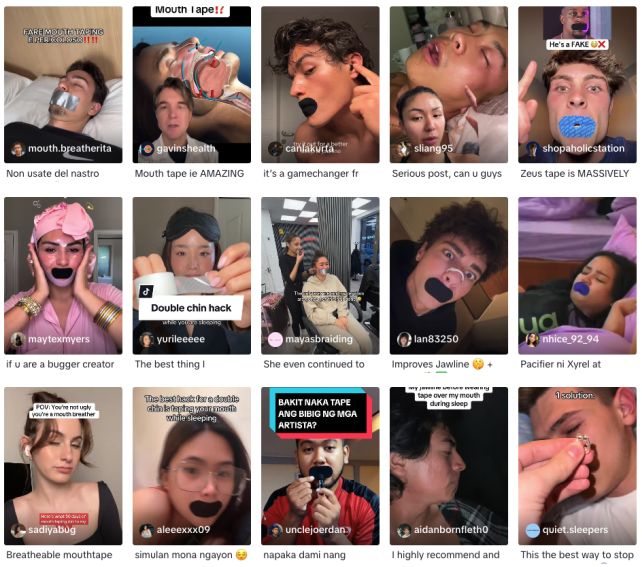If you struggle with 'mouth breathing' while you sleep, from the occasional snore or full-blown obstructive sleep apnea, you – or your sleep-deprived partner – may be looking for ways to fix it.
In your quest for a peaceful night's sleep, you may quickly come across the social media trend of 'mouth taping': that is, taping your mouth with a particular kind of porous medical tape, to keep it shut while you sleep.
In thousands of TikTok videos, influencers claim this simple trick can solve a litany of problems, from jawline definition to energy levels to oral hygiene to sleep apnea. But as with many 'simple tricks' that go viral online, this one is going to need a whole lot more science to back up any of those anecdotes.
Helpfully, a team of doctors and scientists from the London Health Sciences Center and the University of Saskatchewan College of Medicine have just published a review of the 10 most relevant research papers, spanning data from 213 patients in total, to assess whether mouth taping is even safe, let alone worth the hype.

Each one of those papers investigated how night-time mouth taping or similar techniques affected patients with obstructive sleep apnea, nasal obstruction, or mouth breathing during sleep. Most of the studies took the form of medical visits or formal sleep studies, in which patients are closely monitored while sleeping in a controlled environment.
Two papers showed improvements in patients with mild sleep apnea, in measures that included apnea-hypopnea index, gauged by counting the number of apneas or hypopneas during sleep, or drops in blood oxygen saturation. But overall, the researchers found, there's an absence of evidence supporting the claims of mouth tape proponents.
"Other studies showed that mouth taping offered no differences and even discussed potential risks including asphyxiation in the presence of nasal obstruction," the authors write.
"There are potential serious detrimental health outcomes to those with nasal obstruction who seek oral taping as means to ameliorate their mouth breathing, obstructive sleep apnea, or sleep disordered breathing during sleep."
That makes sense: if you're breathing through your mouth because of a physical blockage in your nose, like a sinus infection, a deviated septum, or nasal polyps, taping your mouth shut is not going to help. Band-aid social media solutions like this can also delay or divert patients from treating the cause of their problems.
It's worth noting the researchers found all 10 existing studies on mouth taping were of poor quality for various reasons, such as a lack of follow-up with participants, non-representative groups, and unclear adjustment for confounding factors that could influence the results. And remember, these were the top 10 papers the researchers could find on the topic.
"There does seem to be a very specific use-case scenario, in patient populations where obstructive sleep apnea is mild, that mouth taping or occlusion may improve [measures of apnea severity]," the team writes.
"However, in other patient populations with nasal obstruction as a cause of mouth breathing or more severe forms of obstructive sleep apnea, there is little evidence to support any clinical benefit for this practice."
You already know this, but if you're having trouble sleeping, or your partner's snores and gasps are keeping you awake, it's best to book a doctor's appointment rather than scrolling the internet for answers. So, go on then!
This research was published in PLOS One.